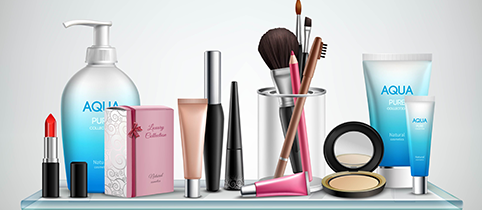COSMETICS AND PERSONAL CARE TESTING

Cosmetics and personal care products are an essential part of our daily routines, ranging from skincare and hair care products to makeup and fragrances. Ensuring the safety, quality, and efficacy of these products is of utmost importance to protect consumers' health and well-being. Here's an overview of cosmetics and personal care product testing:
- Safety Assessment: Cosmetics and personal care product testing involve safety assessments to identify potential risks associated with product ingredients. Testing aims to detect harmful substances such as heavy metals, allergens, and irritants that could cause adverse reactions in users.
- Toxicological Testing: Toxicological testing evaluates the toxicity of cosmetic ingredients to determine safe usage levels and potential hazards. This ensures that products do not pose health risks even with prolonged use.
- Stability Testing: Stability testing assesses the product's ability to retain its quality and efficacy under various conditions, such as temperature, humidity, and light exposure. It helps determine the product's shelf life and proper storage recommendations.
- Microbiological Testing: Microbiological testing examines cosmetics and personal care products for the presence of harmful microorganisms. Ensuring that these products are free from bacterial, fungal, or viral contamination is crucial for user safety.
- Allergenic Substances Testing: Allergenic substances testing helps identify ingredients that may cause allergic reactions or sensitivities in certain individuals. This is particularly important for products applied directly to the skin.
- Efficacy and Performance Evaluation: Testing evaluates the performance and effectiveness of cosmetic products, such as moisturizers, anti-aging creams, and shampoos. This ensures that products deliver the claimed benefits and meet consumer expectations.
- Product Labeling Compliance: Testing laboratories verify the accuracy of product labeling, including ingredient lists, product claims, and usage instructions. This helps ensure that consumers receive transparent and reliable information about the products they purchase.
- Sunscreen Testing: Sunscreen products undergo specific testing to determine their sun protection factor (SPF) and protection against harmful UVA and UVB rays. Properly tested sunscreens provide consumers with effective sun protection.
- Claims Substantiation: Testing laboratories conduct studies to substantiate the efficacy of specific claims made by cosmetic and personal care products. This includes claims such as "long-lasting," "oil-free," or "hypoallergenic."
- Regulatory Compliance: Cosmetic and personal care product testing ensures compliance with local and international regulations, such as those set by the Food and Drug Administration (FDA) or the European Commission. Compliance helps businesses navigate legal requirements and gain consumer trust.
By conducting comprehensive testing on cosmetics and personal care products, manufacturers can provide safe, effective, and high-quality products to consumers. Testing laboratories, accredited under ISO 17025, play a crucial role in verifying product safety and performance, instilling confidence in consumers and promoting a thriving and trustworthy cosmetics and personal care industry.
